
Justin Cord, protagonist of The Unincorporated Man (2010 Prometheus Award winner for Best Libertarian Novel) once quips that, “You often learn more about a situation from the questions than the answers.”
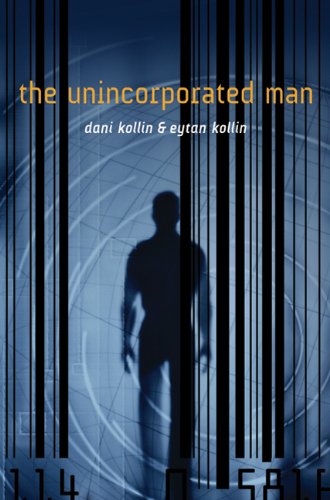
My highest praise for the book is for the questions it raises in the best tradition of social science fiction, questions that get us thinking about economic, legal, and even financial institutions in new ways. The book portrays a future society with a minimalist limited government, strong corporations, and a universal system of “personal incorporation.”
Each person is owned by a shifting combination of self and others through a joint stock arrangement set up at birth. Making corporations personal serves to amplify and universalize the conventional image of corporate titans maneuvering against each other for power and position. Everyone plays the “corporate game” and plays it with their whole lives, not just their jobs. Into this mix awakens one man from 300 years of suspended animation. Can he remain wholly self-owned? Will his ancient ideas of autonomy infect others and upset the new social order?
[continue reading…]
Help Promote Prometheus Unbound by Sharing this Post
When I wasn’t paying attention Jeff Riggenbach did two more audio podcasts on libertarianism and science fiction in his series for the Mises Institute, The Libertarian Tradition. Here is one, a followup on the previous podcast on libertarian science fiction.
You can also read the transcript, which was later published as a Mises Daily article: “Some Further Notes on Libertarian Science Fiction.”
In the podcast, Riggenbach discusses Anthony Burgess’s novel A Clockwork Orange and several novels by Philip K. Dick (including The Man in the High Castle, which our own Matthew Alexander recently reviewed) as well as two nonfiction books.
Help Promote Prometheus Unbound by Sharing this Post
Finalists for the 2011 Prometheus Award for best libertarian novel were announced just yesterday. One finalist, Ceres, by past award-winner L. Neil Smith, has already been reviewed on Prometheus Unbound. Also making the cut is Cory Doctorow’s For The Win. I have a copy of this novel and plan to review it soon, after I publish a few overdue reviews.
As a reminder to our readers, we are open to submissions of reviews (as well as news, articles, interviews). Even if you can’t contribute regularly, we’d like to have a number of part-timers on our staff who only contribute occasionally. We’re even open to one-time contributors.
So if you’d like to read and review one of the other Prometheus Award finalists, nominees, past winners, or another piece of fiction, we’d be happy to consider it for publication.
Below is the full press release from the Libertarian Futurist Society, which presents the Prometheus Award:
[continue reading…]
Help Promote Prometheus Unbound by Sharing this Post
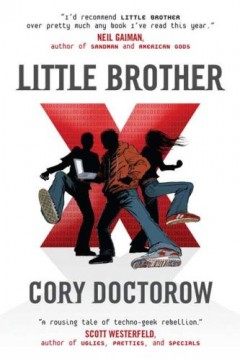
Cory Doctorow’s Little Brother is a tale about tech-savvy teenagers as they rebel against a Department of Homeland Security crackdown following a terrorist attack on San Fransisco. A piece of YA fiction that even adults can enjoy — it’s YA largely because of its teenage protagonists and its educational aim at young people — Little Brother is the 2009 Prometheus Award winner for best libertarian novel. Little Brother also won the John W. Campbell Memorial Award and was a finalist for the Hugo Award.
Little Brother is set entirely in San Fransisco, California, in the very near future. Much of the technology in the story is already available, and what is not can easily be conceived as being on the horizon. The story is told entirely in the first person, from the point of view of the main character, Marcus Yallow. Marcus at first goes by the handle w1n5t0n (Winston in leetspeak, a homage to George Orwell’s 1984, as is the title of the book) but later switches to M1k3y (which could be a reference to the computer Mike in Robert Heinlein’s The Moon is a Harsh Mistress).
As the story opens, we are introduced to Marcus and three of his friends — Jolu (Jose Luis), Van (Vanessa), and best friend, Darryl — who ditch school to play an ARG (Alternate Reality Game) called Harajuku Fun Madness in and around the city. They happen to have the misfortune of being in the wrong part of town when terrorists blow up the Bay Bridge. In the chaos and confusion that follows, they get picked up by the Department of Homeland Security and then subjected to several days of interrogation and psychological torture in a “Gitmo by the Bay” before being released (with the exception of Darryl) with threats to keep quiet about their experience…or else. But once set free, Marcus and his friends are disturbed to see their city being turned into a police state.
Marcus resolves to fight back against the DHS, to restore civil rights and liberties and to free Darryl. He soon becomes the unofficial leader of a growing, decentralized movement of rebellious teenagers. But his covert struggle starts to put a strain on his relationships with his family and friends.
[continue reading…]
Help Promote Prometheus Unbound by Sharing this Post
In a new addition to the Mises Institute’s online media library today, part of The Libertarian Tradition podcast series, Jeff Riggenbach discusses libertarian science fiction.
Riggenbach discusses the role of science fiction in keeping individualism alive, the phenomenon of all the best known libertarian novels being science fiction novels, Eric S. Raymond’s “A Political History of SF” in which Raymond argues that science fiction has a natural affinity with libertarianism, and the importance of dramatizing our values (pdf).
Reviewed in some detail are A.E. van Vogt’s novel The Weapon Shops of Isher and Eric Frank Russell’s novel The Great Explosion.
Transcript.
Help Promote Prometheus Unbound by Sharing this Post
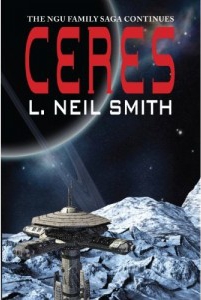

Ceres, a finalist for the 2011 Prometheus Award for best libertarian novel, is the latest opus from noted libertarian author L. Neil Smith, best known for The Probability Broach. As you would expect from Mr. Smith, Ceres is a treasure trove for the liberty lover, a work that could only come from an uncompromising libertarian. Nearly every page has some sound libertarian principle or perhaps a new twist on libertarian ideas that the reader may not have considered before. For instance, we know that government is coercion, an institution organized around this principle, but have we considered the role of agriculture in the development of the State? Was it perhaps our settling down into permanent communities that allowed for the contraction of that particular disease? Right or wrong, it’s food for thought and worth considering. Ceres is filled with such things.
The story takes place in the 22nd century and follows the lives of characters connected in some way to the terraforming of Ceres, the planetoid – now called a dwarf planet — and largest object in the main asteroid belt. Most of the protagonists belong to the Ngu family, and those that don’t are close friends. Llyra Ayn Ngu is a figure skater born on Pallas, an object in the asteroid belt even smaller than Ceres. She goes to Ceres to acclimate her body to its greater gravity, and from there moves to the Moon, and thence to Mars and finally to Earth, where she dreams of ice skating success.
The different sections of the book are named after the gravity of each body, whether it’s one tenth gee, one sixth, one third or one gee. Given this, we might call Llyra the main character, although her brother Wilson gets just as much attention. Nevertheless, Llyra’s goal and struggle to achieve it are the only constants in the novel, present from the opening chapter to the end. The rest concerns the various interests of the Ngu family and friends, often when in conflict with the environmentalists who seek to stop human expansion into space and the sullying of the environment as they see it.
It is beyond dispute that L. Neil Smith is a dedicated libertarian. He has spent many hours of his life pouring himself into prose, seeking to spread the libertarian ethic and philosophy for the betterment of mankind. However, just as, in a debate, a libertarian stands a better chance of convincing if the other party genuinely likes him, so too does a book stand a better chance of convincing in proportion to how much it charms the reader. One might make a few suggestions in the interest of getting the most out of Ceres.
[continue reading…]
Help Promote Prometheus Unbound by Sharing this Post
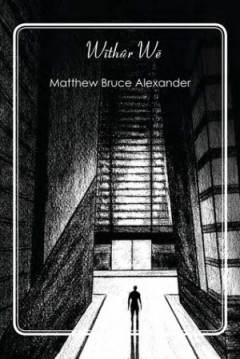
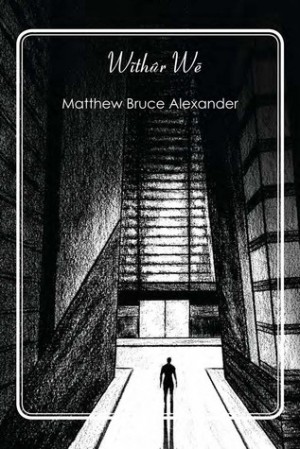
[Warning: Contains some spoilers, mainly in the 6th and 7th paragraphs.]
Every so often a book comes along that truly makes you appreciate writing as a subject; one that truly captures the imagery that we see and feel in our lives when we so often lack the time for reflection.
Wĭthûr Wē is such a book. Yet, such a recommendation doesn’t quite do it justice because its beautiful imagery is only a backdrop for a rich libertarian narrative and struggle of ideas.
Wĭthûr Wē is set several centuries in the future. We never learn the exact year but late in the book we discover that it must be the 28th century. Humans have colonized a small portion of the galaxy — perhaps a thousand light years across — but have yet to discover any alien civilizations. Only the three million year old Ruins on the planet Kaldis provide any proof that non-human intelligence exists, or at least existed once, in the universe.
Alistair Ashley 3nn, the main character of the tale and mouthpiece of Rothbardian philosophy, has just returned from his tour of duty on Kaldis, a human colony at war over their form of government. His experiences have obviously marked him, because those who knew him before he left remark on how different he now is, both physically and emotionally. Alistair has prepared well for his return to Aldra, his home planet, and its tightly regulated — and therefore wÄthà»ring — economy. Through a clever, and very sci-fi, technique, he smuggles instructions for making black market medicine and sells them to black market merchants. He demands gold, not the easily inflatable Aldran Credit which is nothing more than a bit of electronic information stored on a magnetic strip.
Alistair, who has disavowed the 3nn which the government tacked onto his name, was taught the principles of libertarianism by his grandfather who died while he was “off” on Kaldis. He returns angry at the atrocities he has seen and his anger only grows when he sees how much further towards serfdom his home planet has travelled in the four cycles (years) since he has been off. When his father’s home is stolen by the government in an Aldran version of eminent domain, he uses the money from his medicine sale to begin his own private rebellion. He begins by burgling the house of the politician who stole his father’s home, bitterly noting as he leaves that most people would consider Alistair the thief, and not the politician.
[continue reading…]
Help Promote Prometheus Unbound by Sharing this Post














